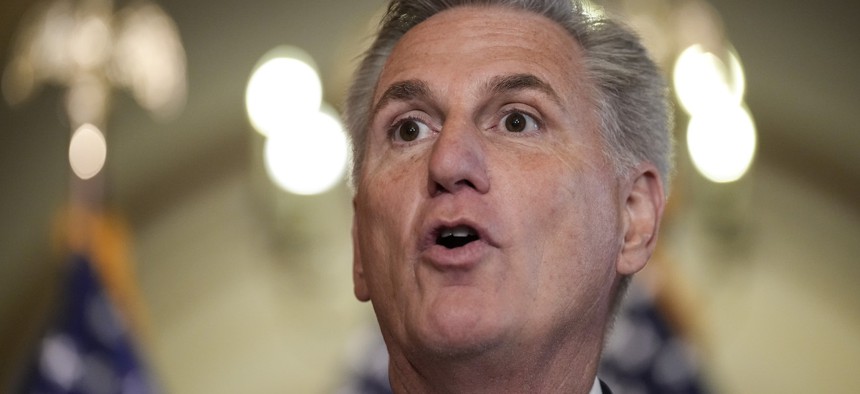
House Speaker Kevin McCarthy, R-Calif., speaks to reporters at the U.S. Capitol on July 27, 2023. Many in the GOP caucus are hoping to use findings from various investigations as a basis to impeach President Biden. Drew Angerer/Getty Images
Will a shutdown’s impact on impeachment probes compel conservatives to approve funding? GOP leaders hope so
Congress faces a tight timeline to avoid a shutdown when lawmakers return to Washington in September.
Republican leaders are using a specific threat to motivate members wary of a funding agreement to vote to keep government open: the impact a shutdown would have on investigations in President Biden and his family.
Top House Republicans have voiced their support for a short-term spending bill that would tide over federal agencies at their current appropriation level, but now must sell the plan to skeptical conservatives in their own party who have threatened rebellion. Those members have floated a number of demands and alternative solutions to a “clean” continuing resolution, but to date leadership has not expressed an interest in amending a spending measure with provisions that would make passage more difficult and a shutdown more likely.
As an incentive to vote for a spending measure—which will likely also include some package of emergency funding for disaster relief, Ukraine aid and other priorities—Republican leaders are warning a shutdown would likely force their colleagues to pause probes into Biden and his son, Hunter. Many in the caucus are hoping to use whatever findings result from those investigations as a basis to impeach Biden, which House Speaker Kevin McCarthy, R-Calif., has promised to pursue.
"I would actually like to have a short-term CR, only to make our argument stronger," McCarthy told Fox News on Sunday. "If we shut down, all of government shuts it down, investigations and everything else. It hurts the American public."
Senate Majority Leader Chuck Schumer, D-N.Y., said earlier this month he and McCarthy previously agreed to pursue a short-term spending bill when Congress returns from recess. Members of the House Freedom Caucus have put forward a series of requests on conservative policy issues, saying they would vote against any CR that does not meet them. Those demands, which include restrictions on the departments of Justice and Defense, would be non-starters in the Democratically controlled Senate.
Rep. James Comer, R-Ky., who is leading one of the investigations into the Bidens as chairman of the House Oversight and Reform Committee, predicted there would not be a shutdown when current funding expires Sept. 30. He echoed McCarthy’s concerns that an appropriations lapse could force a furlough of employees who are providing documents and information to his panel.
“I'm optimistic there won't be a shutdown, but any type of shutdown would interfere with our investigation,” Comer said on Fox News on Tuesday. “Any excuse the Biden administration can give not to be transparent with the House Oversight Committee, they're going to take that.”
So far, the two chambers of Congress are moving along very different tracks. The Senate Appropriations Committee has now approved all 12 annual must-pass spending measures, all with broad bipartisan support. Its House counterpart, meanwhile, has approved bills solely along partisan lines after it used spending levels set below those to which Republican leadership and President Biden agreed as part of the Fiscal Responsibility Act.
The full House approved one spending bill—funding the Veterans Affairs Department—without any Democratic support before the August recess but scuttled a second funding measure due to conservative complaints that the appropriation for the Agriculture Department was still too high. McCarthy is planning to take up more of its spending bills in September.
Many conservative lawmakers have reiterated this week they will not vote for any CR as it would continue funding at fiscal 2023 levels, which they argued were too high. The spending caps agreed to as part of the deal to raise the debt ceiling froze non-defense discretionary spending for fiscal 2024 at their current levels. The bipartisan funding bills in the Senate have closely tracked those caps.
Complicating the matter is Biden’s push to include $40 billion in emergency funding in any stopgap bill, which the White House has said is necessary to tide over Ukraine aid efforts, the disaster relief fund and border security and migrant processing accounts. Some conservative lawmakers have objected to bypassing the caps agreed to as part of the debt ceiling deal, though such supplementals are routine.
If Congress has not passed line-by-line appropriations for each agency by Jan. 1, an automatic, across-the-board 1% cut from current levels will take effect.







